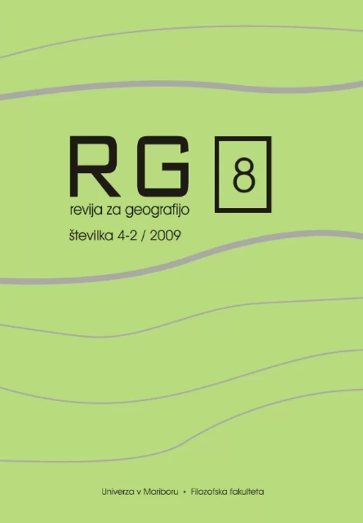Problems and Perspectives of Organic Farming in Slovene Istria
DOI:
https://doi.org/10.18690/rg.4.2.3196Keywords:
Slovene Istria, Slovenia, rural areas, sustainable development, organic farmingAbstract
In Slovene Istria, natural conditions for the development of organic farming are good, though we have only witnessed the rise of organic farming over the last few years. Due to the lack of data related to organic farming in Slovene Istria, field-work was conducted in spring 2008 with some additional research in 2009. Questionnaires and interviews with organic farmers include various aspects: characteristics of their farming activities, demographic and socio-economic features, and others. The prevailing branches of organic farms in Slovene Istria are olivegrowing and mixed production. We can also mention a very high educational level of farmers and positive age-structure of households on organic farms. Possible perspectives related to organic farming in the studied area have been discussed in the conclusion of the paper.
Downloads
References
Bavec, M. et al. 2001: Ekološko kmetijstvo. Ljubljana, Založba kmečki glas.
Bureau Veritas 2008: Certification of agricultural crops and food. Data about costumers in Slovene Istria, included in the organic farming control system, May, 2008. The e-mail correspondence stored at the authors.
Fras, B. 2008: Boris Fras, organic farmer and the president of the Zveza združenj ekoloških kmetov Slovenije / Union of Slovenian Organic Farmers Associations. Interview. Ankaran, May 2008.
IKC – Inštitut za kontrolo in certifikacijo Univerze v Mariboru 2008: IKC - Institute for the control and certification of University of Maribor. Data about costumers in Slovene Istria, included in the organic farming control system, May, 2008. The e-mail correspondence stored at the authors.
ITR - Inštitut za trajnostni razvoj / Institute for Sustainable Development 2008: http://www.itr.si (2008-7).
Lampkin, N. H. 1994: Organic farming: Sustainable Agriculture in Practice. V: Lampkin, N. H., Padel, S.: The economics of organic farming: an international perspective. Wallingford, CAB international, 3-9.
Kocjan Ačko, D. 2002: Sonaravno pridelovanje hrane. Ljubljana, GEA, 12, 5, 14-24.
Komat, A. 1999: Park za življenje Dragonja, stanje in perskpektive. Http://dragonja.mbss.org/dragonja/delavnice/StanjeInPerspektive_15081999.html#vrh (2009-07).
KON-CERT 2008: Inštitut za kontrolo in certifikacijo v kmetijstvu in gozdarstvu Maribor / Institute for inspection and certification in agriculture and in silviculture Maribor. Data about costumers in Slovene Istria, included in the organic farming control system, May, 2008. The e-mail correspondence stored at the authors.
Ogrin, D. 1995: Podnebje Slovenske Istre. Koper, Založba Annales.
PKG - Popis kmetijskih gospodarstev, Slovenija, 2000 / Agricultural Census, Slovenia, 2000 (2002): Statistični urad Republike Slovenije / Statistical Office of the Republic of Slovenia, Http://www.stat.si/publikacije/pub_rr777-02.asp (2008-09).
Plut, D. 1976: Koprsko Primorje in njegova valorizacija za kmetijstvo in turizem. Ljubljana, Filozofska fakulteta.
PVO - Program varstva okolja za Slovensko Istro 2006 – 2010 2006: Http://www.opvo.mop.gov.si/opvo_08/opvo_slovenska_istra.pdf (2008-09).
Rejec Brancelj, I. 1995: Agrarnogeografska problematika koprskega primorja z vidika varstva okolja. Geographica Slovenica, 26/2. Ljubljana, Inštitut za geografijo.
RPP - Razvojni program podeželja za občine Koper, Izola in Piran 2007-2013 2006: Http://www.rrc-kp.si/files/RAZVOJNI%20PROGRAM%20PODEZELJA.pdf (2008-09).
RRP - Regionalni razvojni program Južne Primorske 2007-2013 2006: Http://www.rrc-kp.si/files/RRP-verzija%2018-29.11.06.pdf (2008-08).
Stolze, M. et al. 2000: The Environmental Impacts of Organic Farming in Europe. Organic Farming in Europe: Economics and Policy (Vol. 6). Stuttgart-Hohenheim, University of Hohenheim.
Survey 2008: Questionnaire about characteristics of organic farming in Slovene Istria. Koper, May-July 2008. Completed questionnaires are archived with the authors.
Štancar Poprask, T. 2008: Ekološko kmetijstvo na vodovarstvenih območjih. Diplomsko delo, Ljubljana, Univerza v Ljubljani, Filozofska fakulteta.
Downloads
Published
Issue
Section
License
Copyright (c) 2009 Dane Podmenik Adam, Simon Kerma

This work is licensed under a Creative Commons Attribution 4.0 International License.
